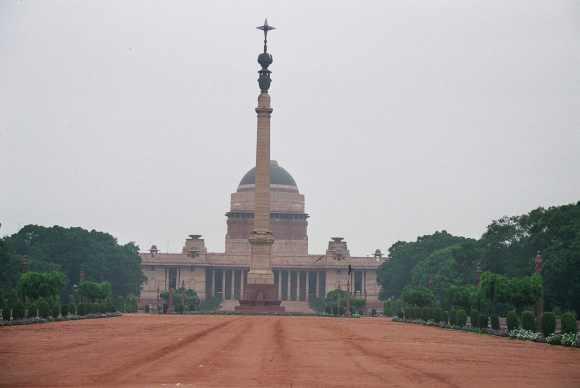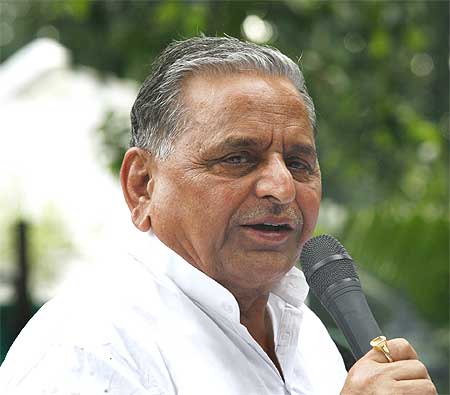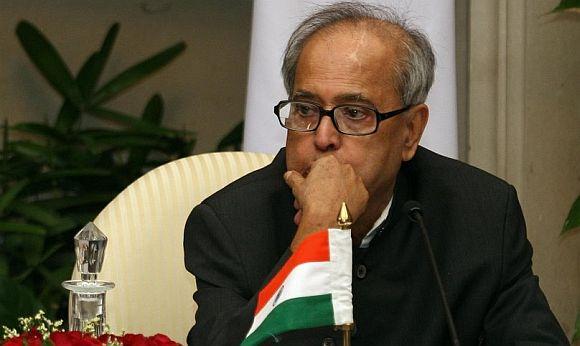 | « Back to article | Print this article |
President Mukherjee and the future of Indian politics
Pranab Mukherjee's likely clear and impressive victory in the presidential poll will in no way reverse the perceptible decline of the Congress, says Subir Roy.
The way Pranab Mukherjee has been able to sew up his election as the next President of India says volumes about the nature of politics that will likely run the country over the next several years. With this kind of politics in control, is there a reasonable chance that India will be run better than it has been in the last few years?
Mukherjee has been able to garner support way beyond the remit of the Congress and his likely clear and impressive victory will in no way reverse the perceptible decline of the Congress. Major regional leaders - Sharad Pawar, Bal Thackeray, Nitish Kumar and Mulayam Singh Yadav - have all switched sides to back him. Significantly, even as his father has backed Mukherjee, Uttar Pradesh Chief Minister Akhilesh Yadav has declared that the ruling United Progressive Alliance has little future.
So what is Mukherjee's USP? He is unfailingly amiable and has over decades developed good personal relations across party lines. He knows how to do a favour and, later, how to encash the goodwill so stored up. And someone who has been Union finance minister twice, with the tax administration under him, can do a lot of favours.
But Mukherjee's appeal runs deeper. He is a kindred spirit to fellow creatures of the Indian political system, a member of a well-defined brotherhood. They would rather back him than a lightweight like P A Sangma or an outsider like Vice President Hamid Ansari.
Click NEXT to read further...
Regional leaders will run the show for some time after 2014
If this be so, then what does the future hold? The last round of assembly elections has thrown up a twofold likelihood. The arbiters of the future will not be the two contending alliances, the UPA and the National Democratic Alliance, but increasingly powerful regional leaders from Tamil Nadu to Punjab to West Bengal. They will run the show for some time after 2014 by forging new alliances - and since, in terms of political culture, most of them are so attuned to Mukherjee, a look at his career can give us a clue to the policies the regional leaders may prefer.
During his first stint as finance minister, in the early 80s, Mukherjee was happy to go along with Indira Gandhi's decision not to draw the last tranche of the large historic International Monetary Fund loan that was taken to help open up the Indian economy.
Rising output from Bombay High and burgeoning remittances from the Gulf after the oil price rises of the seventies enabled India to forego a part of the IMF loan. Result? Reforms stayed put at a halfway house, with calamitous consequences visiting the Indian economy at the end of the decade.
During his second stint as finance minister, Mukherjee presided over the decline of the Indian economy from growth of nine per cent to six per cent. Reforms have stalled and key indicators have gone into reverse. The global turmoil and coalition partner intransigence have been blamed, but several episodes and their consequences can be firmly traced to the finance minister's doorstep.
He cleverly arrogated to the finance ministry the role of an arbiter over all regulators as a result of a quarrel between the securities and insurance regulators, thus taking away from the Reserve Bank of India a part of the autonomy that ought to be its.
Click NEXT to read further...
Mukherjee an old-style, pre-reform politician
Then the ministry gave a poor account of itself over the appointment of the head of UTI Asset Management Company. By insisting on its own candidate, the ministry negated the efforts of a well-worked-out selection process and revealed itself to be oblivious to the need for firms in which the government has a significant stake to be run professionally. Then again, the retrospective tax laws signalled in the last budget have shaken foreign investors' confidence at a time when foreign direct investment is sorely needed to counter the rising current account deficit.
Instead, a range of measures have been signalled that will add to the country's foreign debt and increase its stock of volatile short-term capital.
Mukherjee is, thus, an old-style, pre-reform politician with strong political skills. By supporting him, Mulayam Singh Yadav and company may be indicating the culture of governance that they are comfortable with.
On the other hand, J Jayalalithaa and Naveen Patnaik are, if anything, pro-reform - and Mamata Banerjee could go with anything so long as West Bengal's needs are taken care of.
If this is the scenario, is there no hope of betterment? Can change for the better come only in response to a crisis, as in 1991? What is the chance of getting out of the present half-crisis? Right now the best rational expectation will be muddling through, which is not saying much.
TOP photo features of the week
Click on MORE to see another set of PHOTO features...




